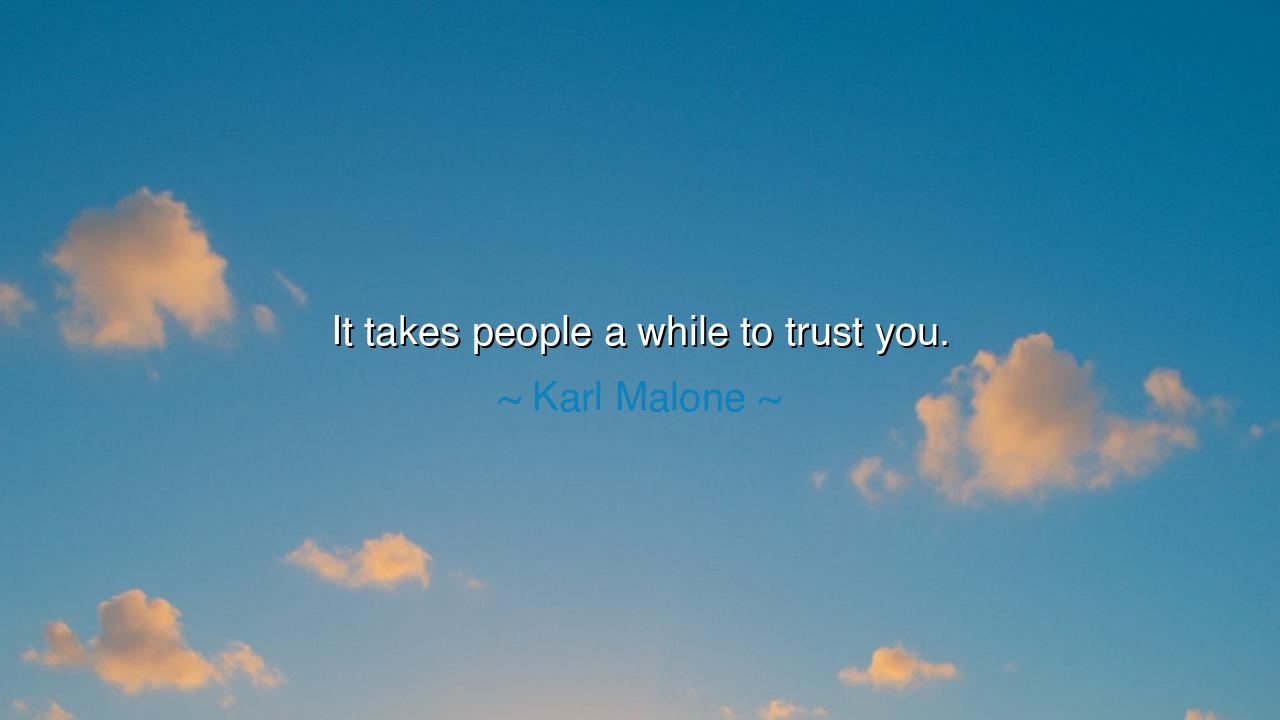
It takes people a while to trust you.






“It takes people a while to trust you.” With these few words, Karl Malone—known to his generation as the Mailman of the court—spoke not only of the game he played but of the greater game of life itself. For trust is not given swiftly, nor is it granted by title, talent, or appearance. Like a tree that must root itself deep into the earth before it may bear fruit, so too must a person prove themselves through time, through constancy, through deeds that speak louder than any boast.
The ancients knew well this sacred truth. They taught that a man’s word was his bond, and that oaths broken could shake the very foundations of a people. Trust, once won, is the strongest of chains; once lost, it is as brittle as dry reeds in the wind. It cannot be demanded nor forced. It must be cultivated, day by day, like the careful tending of a flame that might otherwise flicker and die.
Consider the story of Abraham Lincoln, who rose from humble beginnings. Many mocked him as unrefined, unfit to govern, but he did not seek to persuade by empty words. Instead, he lived with honesty, endured failure with humility, and carried himself with unwavering integrity. Slowly, those who doubted him came to believe. By the time of his presidency, in the darkest hours of the American Civil War, he had become the anchor of a divided nation. His greatness was not instant—it was the fruit of years in which others learned, step by step, that they could trust him.
So too in the realm of the athlete. Karl Malone himself endured seasons of struggle before his teammates, his fans, and even his opponents saw the full measure of his dedication. Each game was a word written upon the scroll of his legacy; each sacrifice, each act of discipline, became part of the testament that he could be relied upon. In this way, he embodied his own words: he did not demand that the world trust him at once, but earned it across years of sweat and perseverance.
Yet let us not forget that trust is fragile. A single betrayal can undo the labor of many years. This is why it is called a sacred bond—it is costly to earn and costly to lose. To live as one who deserves trust is to live with care, to weigh one’s choices, to honor promises, and to act with consistency when it would be easier to falter. It is not the path of ease, but it is the path of honor.
The lesson, then, is for every generation: do not be impatient when others hesitate to place their faith in you. Do not despair if your worth is not immediately recognized. Continue steadfastly. Let your actions speak. Let your words align with your deeds. In time, like stone polished by water, your character will shine, and others will entrust you with their confidence.
Practical wisdom follows: keep your promises, even in the small things. Be consistent in your dealings, whether with the mighty or the humble. Do not boast of your reliability—prove it. And when others finally extend their trust, guard it with reverence, as you would guard a flame from the wind. For once broken, it is not easily restored.
Thus remember Karl Malone’s simple but eternal truth: “It takes people a while to trust you.” Walk the long road with patience. Let your life be a testament, and you will find that, though slow to arrive, the gift of trust is among the most enduring treasures a soul can receive.






.ᰔ. ᰔᩚɑռɦ亗ɦυყᰔᩚ
Malone’s statement resonates with the reality of human connections. Trust does take time, but why is that? Are we naturally cautious, or is it that past betrayals or disappointments shape how we trust others? It also makes me wonder—can we ever fully trust someone, or is trust always something that needs to be re-earned over time?
KTKim Tina
This quote makes me reflect on the process of building trust. We often expect trust to develop quickly, but it’s clear from Malone’s words that it’s something that takes time. Is there a way to speed up this process, or is it always necessary to go through that gradual trust-building phase? In situations like work or friendships, how can we encourage others to trust us more quickly without rushing them?
CTNguyen Thi Cam Tu
I agree with Malone’s point, but it’s interesting—why does it take people so long to trust? Is it just a matter of proving yourself over time, or does it have more to do with the other person’s experiences and fears? In a world where relationships are often fast-paced and based on first impressions, can trust still develop, or is it always slow and gradual?
HNhuy nguyen
Karl Malone’s quote makes me think about the idea of trust in relationships. It’s true that trust isn’t something people just give away, but I wonder if this also applies to how we view ourselves. Do we trust others based on their actions, or is it also influenced by our own insecurities? How long does it take for someone to truly trust themselves, and can that impact their ability to trust others?